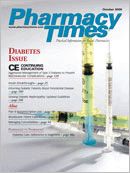Publication
Article
Pharmacy Times
Slowing Diabetic Nephropathy: Updated Guidelines
Author(s):
Approximately 25% of patients with type 1 or type 2 diabetes mellitus develop nephropathy. If nephropathy is not adequately controlled, renal function will progressively decline, as evidenced by decreasing glomerular filtration rate (GFR), and ultimately lead to end-stage renal disease. Approximately 47% of new patients diagnosed with ESRD are diabetics. Chronic kidney disease is defined by at least 1 of the following: kidney damage for 3 or more months; structural or functional abnormalities of the kidney, with or without decreased GFR; pathologic abnormalities or markers of kidney damage; or GFR <60 mL/min/1.73 m2 for 3 or more months, with or without kidney damage. The Table lists the 5 recognized stages of kidney failure.
Improving long-term outcomes in diabetes patients with coexisting chronic kidney disease has recently been addressed by the Kidney Disease Outcomes Quality Initiative (KDOQI). The new guidelines were summarized at the National Kidney Foundation 2006 spring clinical meetings and will be published in the American Journal of Kidney Diseases. Intensive glycemic control, meeting target cholesterol and blood pressure levels, routine monitoring for proteinuria, and dietary protein intake are addressed in the guidelines.
The new KDOQI guidelines confirm what we already know about blood sugar levels and their effect on kidney disease. Multiple well-designed clinical trials demonstrate a reduction in progression or development of nephropathy by achieving tight blood sugar control. Specifically, hemoglobin A1C (HgA1C) of <7% is recommended by the American Diabetes Association (ADA) and HgA1C of <6.5% by the American College of Endocrinologists. The most current ADA standards of medical care in diabetes include a more aggressive statement: "The A1C goal for the individual patient is an A1C as close to normal (<6%) as possible without significant hypoglycemia."
KDOQI guidelines confirm the National Cholesterol Education Panel's targets for lipid control. Diabetes patients with Stage 1 to 4 kidney disease should receive a hydroxymethyl glutaryl coenzyme A reductase inhibitor (statin) in order to achieve a low-density lipoprotein cholesterol level of <100 mg/dL.
A blood pressure goal of <130/80 mm Hg is recommended. The coexistence of hypertension in patients with type 2 diabetes has been firmly linked with the increased risk and progression of renal disease and diabetic nephropathy. Aggressive blood pressure control is essential to slowing the progression of diabetic nephropathy. Most classes of antihypertensive medications can be used to achieve the goal. Because the systemic and intrarenal renin-angiotensin systems are involved in the pathophysiology of diabetic nephropathy, first-line choices, unless contraindicated, should be angiotensin-converting enzyme inhibitors or angiotensin receptor blockers.
KDOQI guidelines include screening recommendations for diabetic kidney disease. Type 1 diabetics should be screened initially 5 years post diagnosis and then once yearly. Type 2 diabetics should begin yearly screening at the time they are diagnosed. A urine albumin/creatinine ratio of <30 mg/g is considered normal while a ratio of 30 mg/g-300 mg/g is consistent with microalbuminuria. Diabetic kidney disease is diagnosed if a patient's albumin/creatinine ratio is >300 mg/g.
Dietary protein intake is also addressed in the guidelines and is an important treatment consideration. Diabetes patients with chronic kidney disease should eat a maximum of 0.8 g of protein per kilogram of body weight per day. Most patients' daily protein intake exceeds this amount.
Although medical guidelines are based largely on clinical trials and expert panel consensus, studies show that they are not widely followed in clinical practice. Pharmacists are ideally positioned to help improve guideline implementation and patient outcomes. By employing strategies such as patient education, medication assessment, and questioning patients about their current diabetic care, pharmacists can help patients delay the progression of nephropathy and renal failure.
Dr. Brian is a clinical specialist with Cornerstone Health Care, High Point, NC.
For a list of suggested reading, send a stamped, self-addressed envelope to: References Department, Attn. A. Rybovic, Pharmacy Times, Ascend Media Healthcare, 103 College Road East, Princeton, NJ 08540; or send an e-mail request to: [email protected].

Newsletter
Stay informed on drug updates, treatment guidelines, and pharmacy practice trends—subscribe to Pharmacy Times for weekly clinical insights.






